Note
What are your top 5 characters ever?
i strongly gravitate towards characters who are altruistic to a fault, so this is a pretty bland list, but i do love them all dearly: edward elric - fullmetal alchemist dale cooper - twin peaks hawkeye pierce - mash obi wan kenobi - star wars shizuku tsukishima - whisper of the heart
#shizuku is an outlier#thank you for this completely random ask-game-esque ask that isn't part of an ask game#replies#anonymous
7 notes
·
View notes
Text
no thoughts only tsukasa and the way he emphatically includes anyone without a second thought
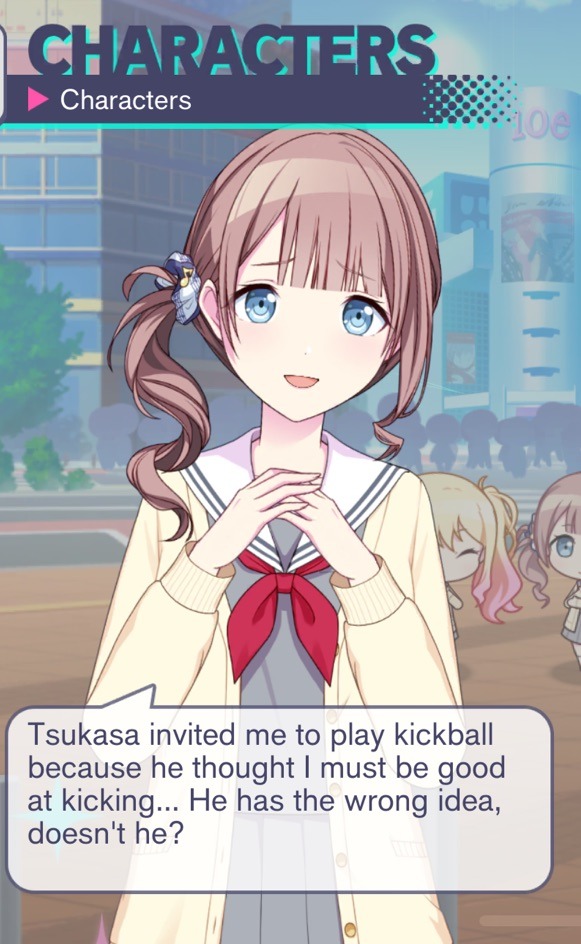
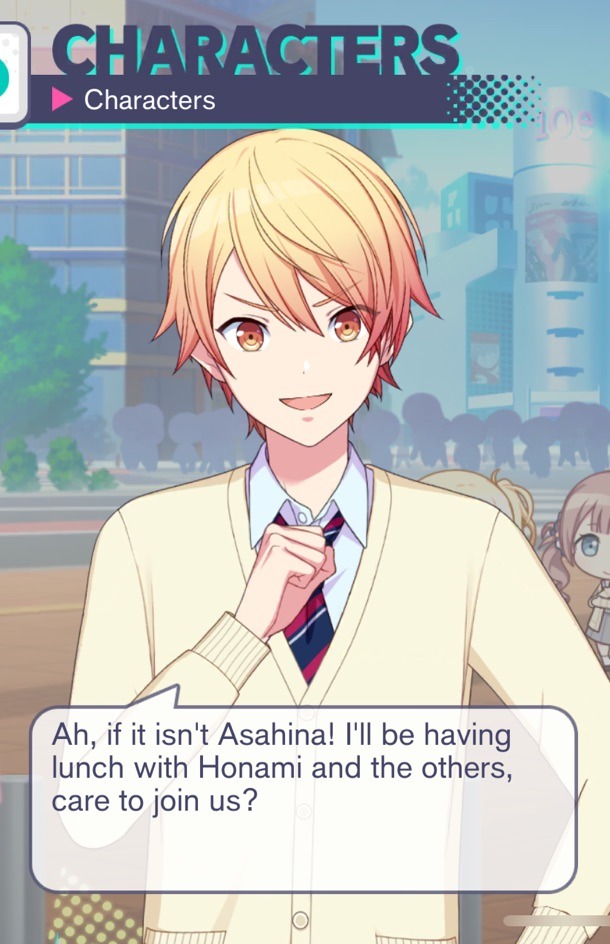
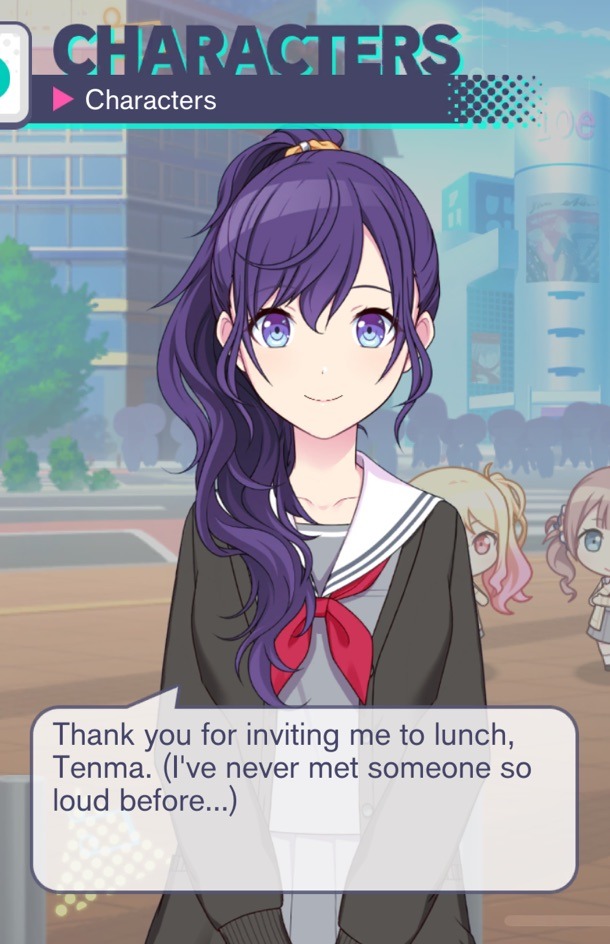
he may be just the littlest bit dense and overwhelming when interacting with others but he has that bright-eyed enthusiasm and willingness to accept others wholeheartedly that reminds me of how younger kids are. and not in a “wow he’s so childish and immature” way. he’s just so BRIGHT and unapologetically himself in the way that kids who are beginning to experience the world tend to be. and that’s such a perfect contrast to the rest of the cautious heart class.
despite his childhood loneliness, his personality wasn’t dampened and he’s honestly not what you’d describe as “cautious” lmao. he kinda skipped that phase where kids become self-conscious of their actions and suppress themselves for the sake of fulfilling expectations. whereas the others in the aptly named cautious heart class have aren’t as true to themselves in some way and are working to be more so
mafuyu, trying to find herself again and obviously having her “good girl” persona
honami, working to stand for her own opinions and ideas instead of always appeasing everyone
kohane, learning to be more out there and to stop worrying about what everybody thinks so much
haruka, always being in idol-mode and realizing that it’s okay to take breaks from that. (her story is different from shizuku’s and how shizuku previously had to hide her clumsiness and whatnot to be the perfect idol in Cheerful*Days, but I think that naturally as an idol, there’s going to be discrepancy between Haruka as a person and Haruka in the eyes of others/fans. this is very apparent in the miya girls school festival event where a girl tells haruka that she’s realized haruka isn’t some unapproachable professional idol that people think her to be. saki inviting haruka to the event committee provided haruka the opportunity to relax and show the less serious, regular-high-school-girl side of herself)
at first glance, tsukasa might seem like he’s an outlier in the cautious heart class. but in actuality, he fits so well because he’s just so great at encouraging the rest of the class to throw away any “cautions” about fitting into a certain expectation and just be themselves instead. obviously he himself doesn’t seem to care much about what others think of him, so he shows the others that it’s not so bad to put yourself out there
hence why he seems to be leading the class in the MV (when I watched it, I initially found it odd that he was so prominent lmao. I have thoughts on rui’s placement in the MV as well but i feel like that’s gonna turn out to be another long ramble LMAO)
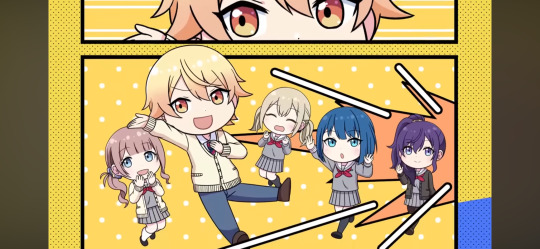
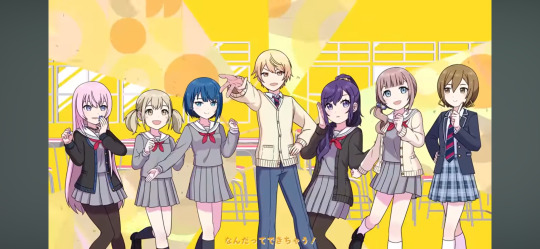
tsukasa tenma, you endearing, endearing little man <3
#as an anxious quiet kid myself I just was so touched by honami’s line about getting invited to kickball LMAO#i haven’t gone through the convos of the april fools event yet#so I feel like I’m gonna find out that my long ass rant about them was just a reiteration of a convo#pls don’t mind this post if that’s the case 🙏🙏#guys ik this is just a silly april fools event but sooooo many thoughts are running around in my brain :’D#tsukasa tenma#pjsk#project sekai#colorful stage#hatsune miku: colorful stage
55 notes
·
View notes
Text
Why the change of “now, I am able to understand and connect with someone without relying on shows, and I’ve come to value the beauty of laughing alongside others (TL tsukasa’s #3 fan)” -> “now, I don’t need shows or anything to get to know someone. On top of that, I want to share smiles and laughter with them” bugs me so much - beyond the fact that the official TL just straight up does not sound like rui - is that like. The fan translation (which, while I’m not a Japanese speaker, I feel comfortable assuming is closer to the intended message than the official one just based on the precedence of ensekai fucking things up) says a lot about rui’s character and the official TL… does Not.
The word choice of “relying on shows” emphasizes the fact that rui has viewed shows as the only way he could connect to people for a very long time. His friendship with wxs is founded in the group’s love for shows. His friendship with Nene as a kid began out of their mutual love for shows. His friendship with Mizuki is an outlier in that it was founded in mutual loneliness, but that’s not something Rui wants to be his primary way of connecting with others. Rui’s dream of creating a show that can reach everyone and bring everyone together regardless of who they are speaks to the fact that he has always seen shows as a way to connect to others when he’s been unable to do so outside of shows. The plot of the RMD show points to that as well (& RMD in general, with him attempting to connect to his classmates through that show).
Rui being a genius has always been something that set him apart from others & his more intellectual interests (engineering, inventing, science) were all things that the average child is not going to be interested in because they’re more interested in like. Playing tag outside. Shows were probably the first thing he had interest in that other people his age would also share an interest in. Now that he’s older, his passions are more understandable for his peers (npc thinking his robots are cool, for example) but he’s still using shows as a way of connecting to others (talking abt directing, story ideas, etc). It’s just not the *only* way he’s able to connect to others. He can just talk to them.
The “I’ve come to value the beauty of laughing alongside others” also says a lot wrt the fact that Rui is a director/producer of shows - he primarily operates from behind the scenes. He makes *others* laugh, but he’s not a part of the audience. Experiencing something together is a way to connect to others, and while Rui creates experiences that allow for that, he’s notably not a part of the actual connections being made. Pandemonium is an event where he’s finally a part of the audience as opposed to being the director (aside from the part where he’s directing shizuku), and he’s experiencing things with other people - not just the parade, but things like card games with his classmates or souvenir shopping/sight seeing with new friends. Rui is valuing experiencing things with others (something that’s new for him) as opposed to creating experiences for others and being divided by the stage.
“now, I am able to understand and connect with someone without relying on shows, and I’ve come to value the beauty of laughing alongside others”: “I’ve realized I’m capable of forming relationships outside of having a shared dream/passion, and I’ve realized that experiencing things with others is one way of connecting with other people that I hadn’t considered before.” There’s a lot to read into here. A piece of dialogue that excellently sums up rui’s character growth.
“now, I don’t need shows or anything to get to know someone. On top of that, I want to share smiles and laughter with them”: “I can get to know someone outside of shows (what is the anything?). I want to have fun with others (implication being that he didn’t want to do that previously??).” Nothing burger statement. Boring. Kind of just spoon feeds you the messaging in pandemonium and doesn’t really speak to rui’s overall character growth.
As a side note even though I care less about the whole “Tsukasa-kun truly knows how to bring endless smiles to my face” -> “Tsukasa’s given me so many reasons to smile” thing, it was really stupid to remove the implication that Tsukasa himself is what is making rui smile/happier given that 1) there’s this line from mizuki in rui’s first birthday card 2) literally IN THIS EVENT one of the npcs is like “we didn’t think you really cared abt other people until you started hanging out with tsukasa”


#mine#rui#I could have sworn mizuki also said smthng along the lines of ‘ur smiling more now that u hang out w tsukasa’#but I could not find it and I’m not spending more time looking for it#analysis#I guess. shrug.
5 notes
·
View notes
Text
;; finished reading unraveled threads and honestly?
average ihaz segment has an anxiety level of over 80% is actually just statistical error. more more jump's feature the future segment georg which had shizuku and minori in the same room is an outlier adn should not have been counted.
#and marina.#she was just kinda put in a bigger issue she had no stakes in and was left to try and keep everyone vaguely on script.#<- i say vaguely because obviously they go off script but
1 note
·
View note
Text
Whisper of the Heart remains Studio Ghibli’s most moving outlier
Twenty five years after its release in Japan, Studio Ghibli’s first theatrical film not directed by either of its co-founders, Hayao Miyazaki and Isao Takahata, stands among its very best. Based on the 1989 manga of the same name by Aoi Hiiragi, Whisper of the Heart is every bit as soulful and thoughtful as the work of director Yoshifumi Kondo’s mentors. It’s said that Kondo would have been their successor, but tragically the animator died from illness in 1998.
Written for the screen by Miyazaki, the film observes teenage girl Shizuku (Yoko Gonna) living in Tama Hills in Tokyo. When we meet her, an unknown boy Seiji has taken out 3 of the same books as her, and her imagination begins to whir – what is Seiji like? The curiosity spurs her on to look for him, and she soon finds his grandfather Shiro’s shop, and with it inspiration to start creating her own work.
From its opening, Whisper of the Heart’s romantic view of the city at night already strikes a different tone to previous Ghibli films, which often concern man’s encroachment on nature’s territory. Swooning cuts of blimps, pylons and other evidence of human connection overtake views of forests and open landscapes, with soundscapes of cicadas, trains and cars mixed with classical and electronic notes from composer Yuji Nomi (a mentee of Ryuchi Sakamato).
This all feels immediately distinct from every Ghibli film that came before it, perhaps with the exception of Isao Takahata’s Only Yesterday. It could be said that’s part of why it has particular favour among Ghibli enthusiasts; it has a quiet and humanist interest in the ecosystem of the city, how people connect and move around, and how art connects them.
Read Next: Only Yesterday is a masterful reflection on youth’s impermanence
Unlike Only Yesterday, however, Kondo focuses on cramped urban spaces over that film’s more spacious middle class, rural living. He could even be said to romanticise them, as Kondo packs every space with the smallest, lived-in details; human habitats imbued with as much wonder as the more fantastical Ghibli films. Most important is the expression of a deep appreciation for all kinds of creativity – whether written or played or crafted, all are equally worthy and expressive, like the clock face in Shiro’s shop.
There’s also song. Shizuku works on translating John Denver’s ‘Take Me Home, Country Roads’ into Japanese for her classmates to perform. That translation is (initially) the focus of much of its musings about creativity, and a pivotal part of the film’s standout set piece, a singalong with Seiji and others. The moment is an emotional turning point for Shizuku, deciding she wants to more directly share her feelings through artistic expression of her own. Like Kiki or Taeko before her, Shizuku is immensely relatable, worried that she hasn’t got the talent to create. But the film assures that there is something there that she need only recognise and polish.
Whisper of the Heart is about how young people make sense of the world, learning to create as well as the agency they need to do so, something Shizuku’s father and Seiji’s grandfather both recognise. It’s not even about solving something entirely, it’s simply about finding the beginning of their path, less a typical coming-of-age story than it is a tale of self-actualisation.
The particulars about Shizuku’s book aren’t important, nor the roughness of her prose – as Shiro puts it, that glimpse of an unpolished jewel of talent is valuable in itself. It’s worth mentioning the literal translation of the film’s title Mimi o Sumaseba, meaning ”If you listen closely”. Through its loving detail and close attention to character, Kondo and Miyazaki determine that it doesn’t matter what form that talent takes. As the title suggests, all you have to do is find it.
The post Whisper of the Heart remains Studio Ghibli’s most moving outlier appeared first on Little White Lies.
source https://lwlies.com/articles/whisper-of-the-heart-studio-ghibli-outlier/
1 note
·
View note